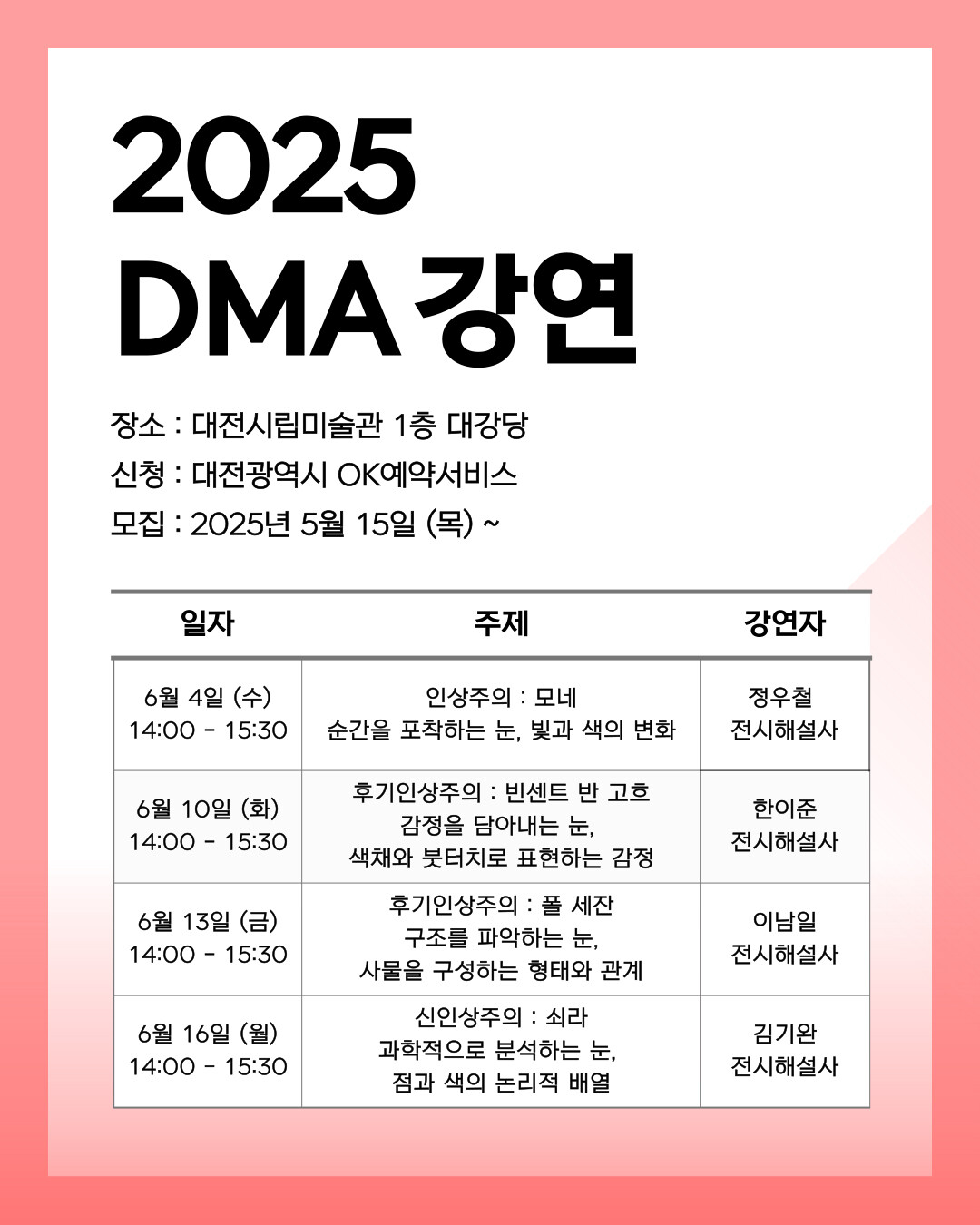
The Daejeon Museum of Art will host "DMA Lecture," a special lecture program on the theme of Impressionism, from June 4 to June 16. This lecture series was organized in conjunction with the "Immortal Painter Van Gogh" special exhibition, which has garnered immense interest, attracting over 100,000 visitors within a month of its opening. The goal is to help citizens gain a deeper understanding of Impressionist art and provide opportunities for artistic enjoyment.
Bringing the Museum Experience to Citizens: The Birth of 'DMA Lecture'
Through the "DMA Lecture" series, the Daejeon Museum of Art aims to directly deliver the vivid stories from the museum to citizens and help more people understand art easily and deeply. This lecture series is particularly meaningful as it is closely linked to the <Immortal Painter Van Gogh> special exhibition currently ongoing at the museum. Vincent van Gogh is a representative painter of Post-Impressionism, and this lecture will survey the major currents of Western art history, from the birth of Impressionism to Post-Impressionism and the transition to modern art, focusing on Impressionism. This is expected to enhance visitors' understanding by comparatively analyzing the unique expressive styles and visual characteristics of artists representing each era.
Special Commentary by Four Leading Korean Docents
Four prominent exhibition commentators (docents) who have actively worked in major Korean art museums and left a deep impression on the public will participate in this lecture series. They will use their rich commentary experience to convey fascinating stories about Impressionist artists and their masterpieces to citizens in an easy-to-understand manner.
Jung Woo-chul, a docent, will kick off the first lecture on Wednesday, June 4. He will lecture on the background of the birth of Impressionism and its expressive methods, focusing on Claude Monet. He will deeply delve into how Monet, often called the 'father of Impressionism,' captured fleeting changes in light and color to initiate Impressionism. Monet explored the ever-changing appearance of nature with light, leaving behind numerous masterpieces such as his 'Haystacks' and 'Rouen Cathedral' series. This will be an important time to understand how his unique perspective and continuous experimental spirit became the foundation of Impressionism.
On Tuesday, June 10, Han Yi-jun, a docent, will continue the lecture focusing on the major works of Post-Impressionist artists. In particular, he will explain the unique painterly characteristics of Vincent van Gogh, the protagonist of the current special exhibition, such as his intense colors and bold brushstrokes. Van Gogh, while inheriting the scientific color theory of Impressionism, established his own unique style that explosively expressed his emotions. Through his representative works like 'Starry Night' and 'Sunflowers,' attendees will be able to delve deeply into his artistic world.
On Friday, June 13, Lee Nam-il, a docent, will explain the progression from Impressionism to modern art, analyzing the compositional methods of objects and the relationships between forms based on Paul Cézanne's works. Cézanne, while exploring the light and color of Impressionism, emphasized the solid forms and structures of objects, profoundly influencing later Cubist art. Through his 'Still Life with Apples and Oranges' and 'Mont Sainte-Victoire' series, he will interestingly explain how he simplified and structured nature to lay the groundwork for modern art.
On Monday, June 16, Kim Ki-wan, a docent, will introduce the intersection of art and science based on the logical arrangement of light and color through 'Georges Seurat's Pointillism and Neo-Impressionism (tentative title)'. Seurat, by dividing colors into dots to allow them to mix on the canvas, pioneered Pointillism and was a forerunner of Neo-Impressionism, which scientifically developed Impressionism. Through his representative works like 'A Sunday Afternoon on the Island of La Grande Jatte,' his profound exploration of light and color can be glimpsed.
Free Lectures and Easy Application Process
The "DMA Lecture" series will be held free of charge, and strong public interest is anticipated. Participation in the lectures can be preregistered on a first-come, first-served basis for 100 people through the Daejeon Metropolitan City OK Reservation Service starting from Thursday, May 15. For those who miss the preregistration, there's no need to worry. An additional 50 people can register on-site on the day of each lecture, providing more citizens with the opportunity to participate. Further details about the lectures can be found on the official website of the Daejeon Museum of Art.
Yoon Eui-hyang, the director of the Daejeon Museum of Art, stated, "This lecture will be a valuable opportunity for classical art to approach citizens more closely," adding, "We hope it will lead to a meaningful time that bridges the gap between the public and the museum, and between artists and viewers."
The "DMA Lecture" is part of the Daejeon Museum of Art's efforts to provide high-quality cultural content to citizens and contribute to improving their quality of life through art. In particular, this lecture series, linked with the Van Gogh special exhibition, is expected to provide a deep understanding of Impressionist art and a special experience that enhances the joy of art appreciation. The museum encourages the active participation of interested citizens.
[Copyright (c) Global Economic Times. All Rights Reserved.]






























